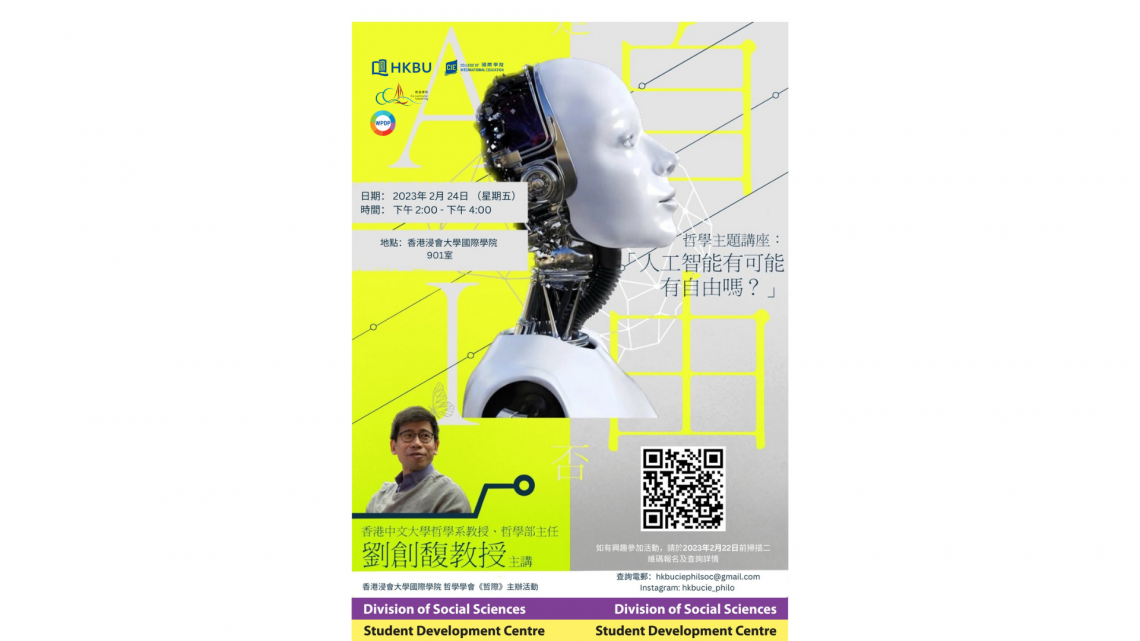由實踐哲學副學士生創立的CIE 哲學學會《哲際》,在本年度2月24日舉辦哲學研討會。學會請來香港中文大學哲學系學部主任劉創馥教授親臨石門校院,跟同學討論和人工智能相關的哲學問題。學會副主席在主席的協助下撰寫研討會報告,在此跟一眾對哲學有興趣的朋友分享。

Philosophy Seminar Report:
Speaker: Professor Lau Chok Fuk, The Chinese University of Hong Kong
Topic: AI and Human Uniqueness
Since ancient times, humans have believed in their uniqueness. However, scientific researches and philosophical investigations have gradually challenged this belief. Today, AI demonstrates impressive capabilities, prompting us to explore its limitations and reevaluate human uniqueness through philosophical inquiry.
The seminar, led by Professor Lau Chok Fuk, an expert in Classical German philosophy, explored the concept of human uniqueness in the light of advancements in artificial intelligence (AI). The interactive session encouraged the 20+ participants to express their views, vote, and question others' arguments. It fostered a stimulating intellectual atmosphere.
Professor Lau began by showcasing ChatGPT's impressive capabilities, such as generating scripts, writing poems, and engaging in philosophical discussions. This set the stage for the core question: "Are humans unique when compared to AI?" Most students argued that humans are fundamentally unique and that AI has limitations. The discussion then proceed to cover various aspects, such as intelligence, emotion, free will, and consciousness.
Intelligence was a key topic, with some students suggesting that humans are unique due to their cognitive abilities. Professor Lau explained that this view aligns with that of the French philosopher René Descartes, who believed that intelligence sets humans apart from non-human animals. However, Alan Turing argued that intelligence is not exclusive to humans and proposed the Turing test – a test of a machine's ability to demonstrate language behavior equivalent to or indistinguishable from that of a human. Large language models, that is, an artificial intelligence model learns from immense quantities of textual data spanning numerous domains and languages like ChatGPT, can already answer questions and interact with humans in conversations, which suggests that intelligence might not be unique to humans if language behaviour is the measure.
Some students proposed assessing intelligence through learning ability instead of language behaviour. They argued that AI merely follows preprogrammed commands and cannot learn. This is premised on the belief that only humans can learn. However, Professor Lau retorted with the concept of machine learning, which allows AI to improve itself without explicit programming, much like human learning.
Having free will also emerged as a potential differentiator between humans and AI. Professor Lau presented a trilemma, asserting that it is nearly impossible to develop a sound theory of free will that distinguishes humans from machines.
First, suppose determinism is real and free will is compatible with determinism. Some may maintain that individuals have free will when their actions align with their desires and beliefs, even if prior causes determine their desires and beliefs. In that case, as Professor Lau states, even a thermostat might have free will since its temperature-control action also aligns with its desires.
Second, if determinism is real and it is incompatible with free will, then clearly both humans and AI do not have free will. In other words, given that determinism is real, free-will is not a significant factor to distinguish humans from machines.
Third, as Professor Lau added, that if human actions are not deterministic, one might argue that humans have free will due to an unexplained mental process that defies physical laws, such as a supernatural soul. However, proving the existence of such a process is complicated.
In conclusion, it is hard to develop a sound theory of free will that distinguishes humans from machines.
To sum up, the seminar highlighted the ongoing debate surrounding human uniqueness compared to AI. Questions about intelligence, free will, and other aspects remain open. It broadened the students’ thoughts, inviting them to explore philosophy and science further.
想知更多課程資訊,或者實踐哲學最新動態,記得 follow PPHI IG:

本年度 66%畢業生已獲八大資助學位課程取錄,修讀哲學或社會科學學士課程;17% 升讀自資學位學士課程。升學率為83%。





